University Business Research Method and Learning Experience Report
VerifiedAdded on 2020/04/01
|9
|1625
|51
Report
AI Summary
This report provides a comprehensive analysis of business research methods and learning experiences. It begins with an introduction to the concept of learning experiences, discussing their effectiveness, usefulness, and various applications, including their role in designing purposeful learning journeys, linking learning goals to activities, and providing real-world simulations. The report then explores the value of learning experiences in terms of course programs, theoretical knowledge acquisition, and future career development. It also details the process of transferring learning knowledge and the importance of focusing on relevance, self-explanation, and diverse learning media. The report further examines the use of business research in the learning process, highlighting its benefits in identifying competitors, understanding target customers, and analyzing organizational strengths and weaknesses. It concludes with a discussion of the overall learning process, its successes and challenges, and a learning plan outlining steps for effective implementation. References to relevant academic sources are also included.
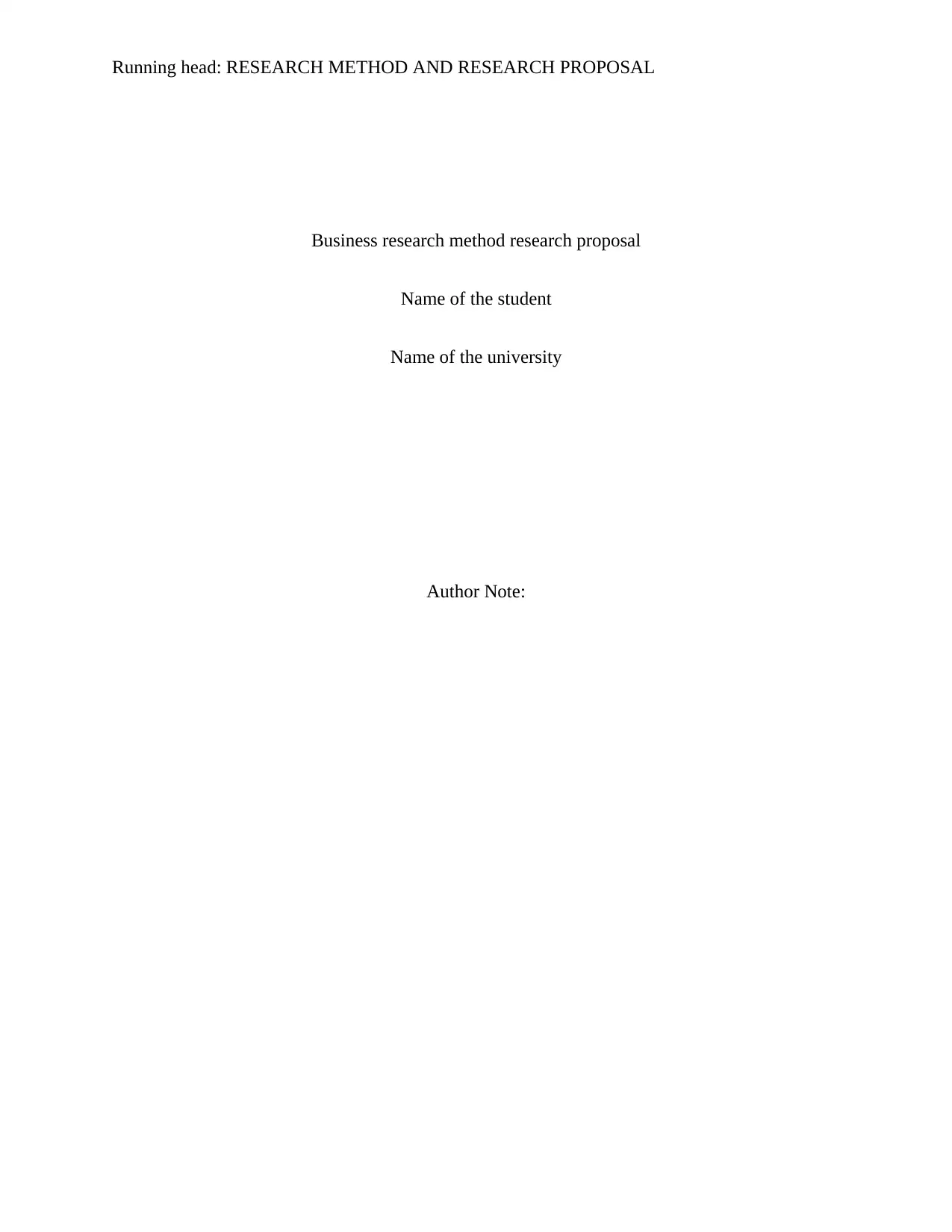
Running head: RESEARCH METHOD AND RESEARCH PROPOSAL
Business research method research proposal
Name of the student
Name of the university
Author Note:
Business research method research proposal
Name of the student
Name of the university
Author Note:
Paraphrase This Document
Need a fresh take? Get an instant paraphrase of this document with our AI Paraphraser
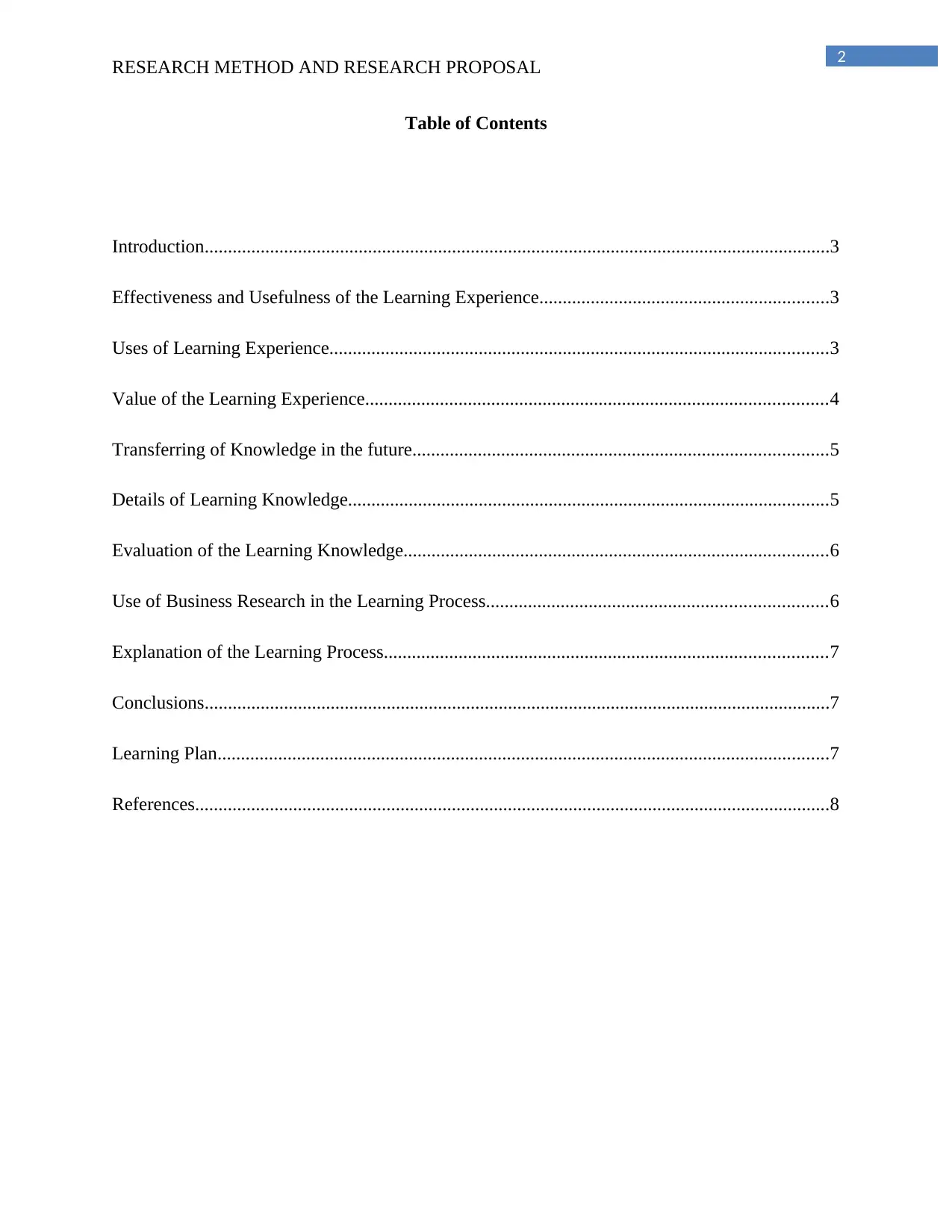
2
RESEARCH METHOD AND RESEARCH PROPOSAL
Table of Contents
Introduction......................................................................................................................................3
Effectiveness and Usefulness of the Learning Experience..............................................................3
Uses of Learning Experience...........................................................................................................3
Value of the Learning Experience...................................................................................................4
Transferring of Knowledge in the future.........................................................................................5
Details of Learning Knowledge.......................................................................................................5
Evaluation of the Learning Knowledge...........................................................................................6
Use of Business Research in the Learning Process.........................................................................6
Explanation of the Learning Process...............................................................................................7
Conclusions......................................................................................................................................7
Learning Plan...................................................................................................................................7
References........................................................................................................................................8
RESEARCH METHOD AND RESEARCH PROPOSAL
Table of Contents
Introduction......................................................................................................................................3
Effectiveness and Usefulness of the Learning Experience..............................................................3
Uses of Learning Experience...........................................................................................................3
Value of the Learning Experience...................................................................................................4
Transferring of Knowledge in the future.........................................................................................5
Details of Learning Knowledge.......................................................................................................5
Evaluation of the Learning Knowledge...........................................................................................6
Use of Business Research in the Learning Process.........................................................................6
Explanation of the Learning Process...............................................................................................7
Conclusions......................................................................................................................................7
Learning Plan...................................................................................................................................7
References........................................................................................................................................8
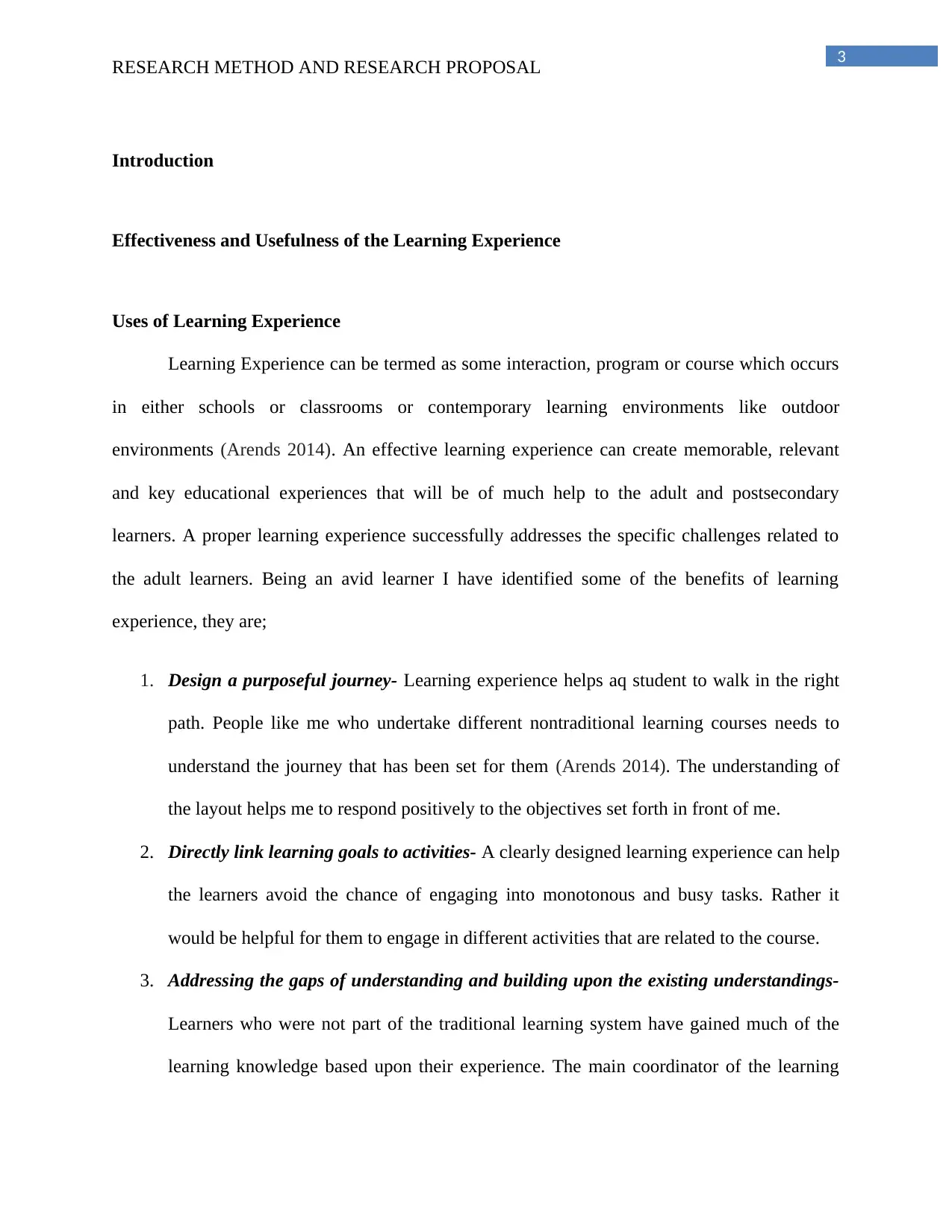
3
RESEARCH METHOD AND RESEARCH PROPOSAL
Introduction
Effectiveness and Usefulness of the Learning Experience
Uses of Learning Experience
Learning Experience can be termed as some interaction, program or course which occurs
in either schools or classrooms or contemporary learning environments like outdoor
environments (Arends 2014). An effective learning experience can create memorable, relevant
and key educational experiences that will be of much help to the adult and postsecondary
learners. A proper learning experience successfully addresses the specific challenges related to
the adult learners. Being an avid learner I have identified some of the benefits of learning
experience, they are;
1. Design a purposeful journey- Learning experience helps aq student to walk in the right
path. People like me who undertake different nontraditional learning courses needs to
understand the journey that has been set for them (Arends 2014). The understanding of
the layout helps me to respond positively to the objectives set forth in front of me.
2. Directly link learning goals to activities- A clearly designed learning experience can help
the learners avoid the chance of engaging into monotonous and busy tasks. Rather it
would be helpful for them to engage in different activities that are related to the course.
3. Addressing the gaps of understanding and building upon the existing understandings-
Learners who were not part of the traditional learning system have gained much of the
learning knowledge based upon their experience. The main coordinator of the learning
RESEARCH METHOD AND RESEARCH PROPOSAL
Introduction
Effectiveness and Usefulness of the Learning Experience
Uses of Learning Experience
Learning Experience can be termed as some interaction, program or course which occurs
in either schools or classrooms or contemporary learning environments like outdoor
environments (Arends 2014). An effective learning experience can create memorable, relevant
and key educational experiences that will be of much help to the adult and postsecondary
learners. A proper learning experience successfully addresses the specific challenges related to
the adult learners. Being an avid learner I have identified some of the benefits of learning
experience, they are;
1. Design a purposeful journey- Learning experience helps aq student to walk in the right
path. People like me who undertake different nontraditional learning courses needs to
understand the journey that has been set for them (Arends 2014). The understanding of
the layout helps me to respond positively to the objectives set forth in front of me.
2. Directly link learning goals to activities- A clearly designed learning experience can help
the learners avoid the chance of engaging into monotonous and busy tasks. Rather it
would be helpful for them to engage in different activities that are related to the course.
3. Addressing the gaps of understanding and building upon the existing understandings-
Learners who were not part of the traditional learning system have gained much of the
learning knowledge based upon their experience. The main coordinator of the learning
⊘ This is a preview!⊘
Do you want full access?
Subscribe today to unlock all pages.

Trusted by 1+ million students worldwide
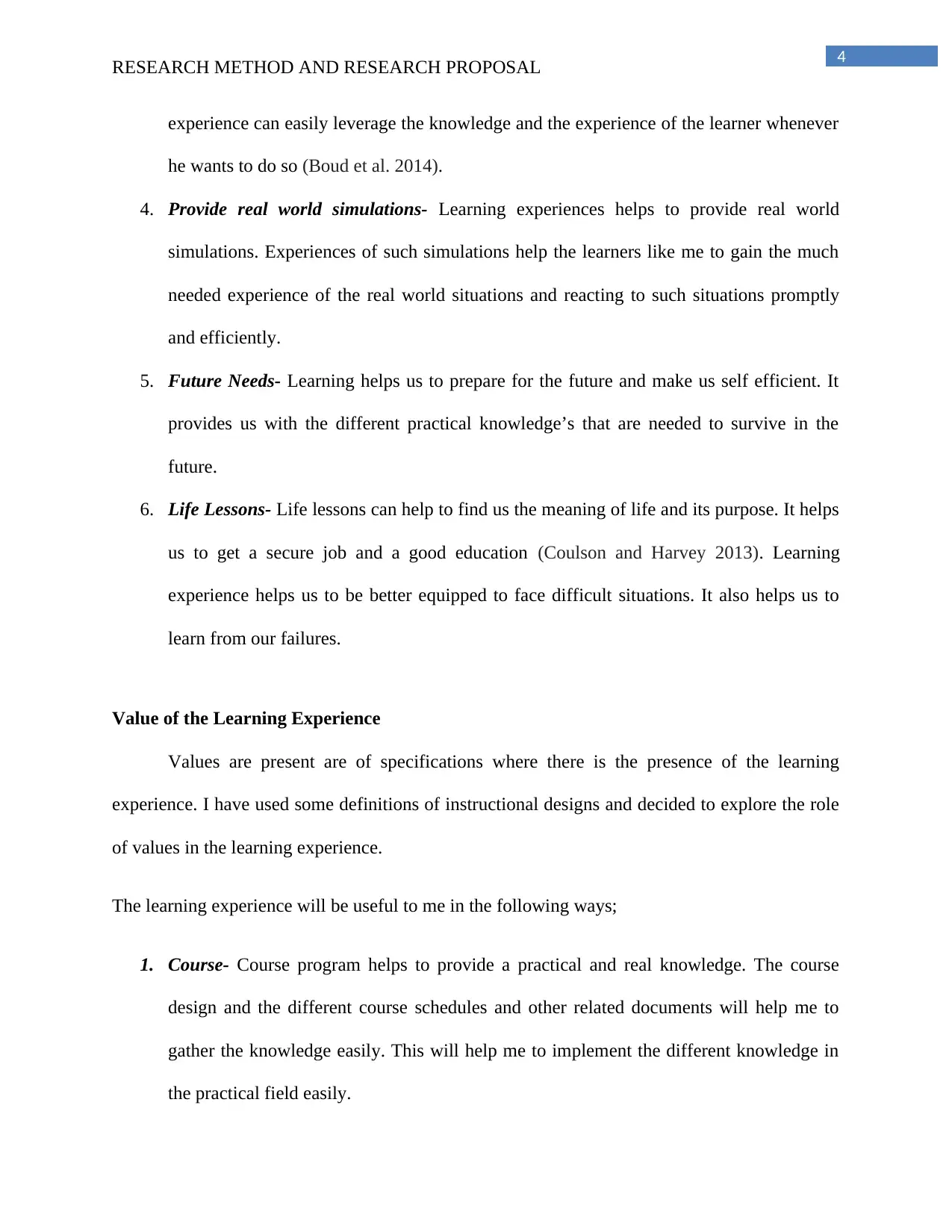
4
RESEARCH METHOD AND RESEARCH PROPOSAL
experience can easily leverage the knowledge and the experience of the learner whenever
he wants to do so (Boud et al. 2014).
4. Provide real world simulations- Learning experiences helps to provide real world
simulations. Experiences of such simulations help the learners like me to gain the much
needed experience of the real world situations and reacting to such situations promptly
and efficiently.
5. Future Needs- Learning helps us to prepare for the future and make us self efficient. It
provides us with the different practical knowledge’s that are needed to survive in the
future.
6. Life Lessons- Life lessons can help to find us the meaning of life and its purpose. It helps
us to get a secure job and a good education (Coulson and Harvey 2013). Learning
experience helps us to be better equipped to face difficult situations. It also helps us to
learn from our failures.
Value of the Learning Experience
Values are present are of specifications where there is the presence of the learning
experience. I have used some definitions of instructional designs and decided to explore the role
of values in the learning experience.
The learning experience will be useful to me in the following ways;
1. Course- Course program helps to provide a practical and real knowledge. The course
design and the different course schedules and other related documents will help me to
gather the knowledge easily. This will help me to implement the different knowledge in
the practical field easily.
RESEARCH METHOD AND RESEARCH PROPOSAL
experience can easily leverage the knowledge and the experience of the learner whenever
he wants to do so (Boud et al. 2014).
4. Provide real world simulations- Learning experiences helps to provide real world
simulations. Experiences of such simulations help the learners like me to gain the much
needed experience of the real world situations and reacting to such situations promptly
and efficiently.
5. Future Needs- Learning helps us to prepare for the future and make us self efficient. It
provides us with the different practical knowledge’s that are needed to survive in the
future.
6. Life Lessons- Life lessons can help to find us the meaning of life and its purpose. It helps
us to get a secure job and a good education (Coulson and Harvey 2013). Learning
experience helps us to be better equipped to face difficult situations. It also helps us to
learn from our failures.
Value of the Learning Experience
Values are present are of specifications where there is the presence of the learning
experience. I have used some definitions of instructional designs and decided to explore the role
of values in the learning experience.
The learning experience will be useful to me in the following ways;
1. Course- Course program helps to provide a practical and real knowledge. The course
design and the different course schedules and other related documents will help me to
gather the knowledge easily. This will help me to implement the different knowledge in
the practical field easily.
Paraphrase This Document
Need a fresh take? Get an instant paraphrase of this document with our AI Paraphraser
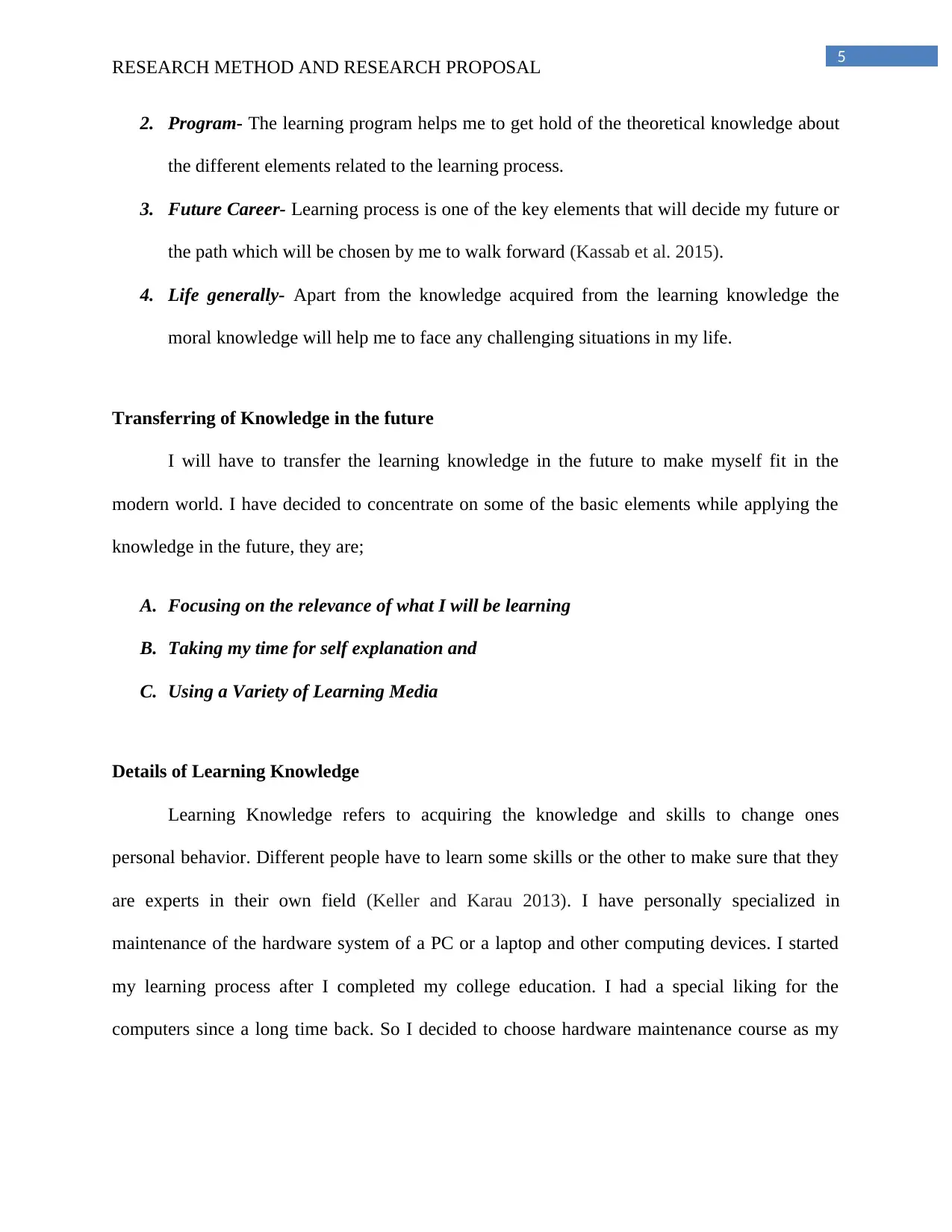
5
RESEARCH METHOD AND RESEARCH PROPOSAL
2. Program- The learning program helps me to get hold of the theoretical knowledge about
the different elements related to the learning process.
3. Future Career- Learning process is one of the key elements that will decide my future or
the path which will be chosen by me to walk forward (Kassab et al. 2015).
4. Life generally- Apart from the knowledge acquired from the learning knowledge the
moral knowledge will help me to face any challenging situations in my life.
Transferring of Knowledge in the future
I will have to transfer the learning knowledge in the future to make myself fit in the
modern world. I have decided to concentrate on some of the basic elements while applying the
knowledge in the future, they are;
A. Focusing on the relevance of what I will be learning
B. Taking my time for self explanation and
C. Using a Variety of Learning Media
Details of Learning Knowledge
Learning Knowledge refers to acquiring the knowledge and skills to change ones
personal behavior. Different people have to learn some skills or the other to make sure that they
are experts in their own field (Keller and Karau 2013). I have personally specialized in
maintenance of the hardware system of a PC or a laptop and other computing devices. I started
my learning process after I completed my college education. I had a special liking for the
computers since a long time back. So I decided to choose hardware maintenance course as my
RESEARCH METHOD AND RESEARCH PROPOSAL
2. Program- The learning program helps me to get hold of the theoretical knowledge about
the different elements related to the learning process.
3. Future Career- Learning process is one of the key elements that will decide my future or
the path which will be chosen by me to walk forward (Kassab et al. 2015).
4. Life generally- Apart from the knowledge acquired from the learning knowledge the
moral knowledge will help me to face any challenging situations in my life.
Transferring of Knowledge in the future
I will have to transfer the learning knowledge in the future to make myself fit in the
modern world. I have decided to concentrate on some of the basic elements while applying the
knowledge in the future, they are;
A. Focusing on the relevance of what I will be learning
B. Taking my time for self explanation and
C. Using a Variety of Learning Media
Details of Learning Knowledge
Learning Knowledge refers to acquiring the knowledge and skills to change ones
personal behavior. Different people have to learn some skills or the other to make sure that they
are experts in their own field (Keller and Karau 2013). I have personally specialized in
maintenance of the hardware system of a PC or a laptop and other computing devices. I started
my learning process after I completed my college education. I had a special liking for the
computers since a long time back. So I decided to choose hardware maintenance course as my
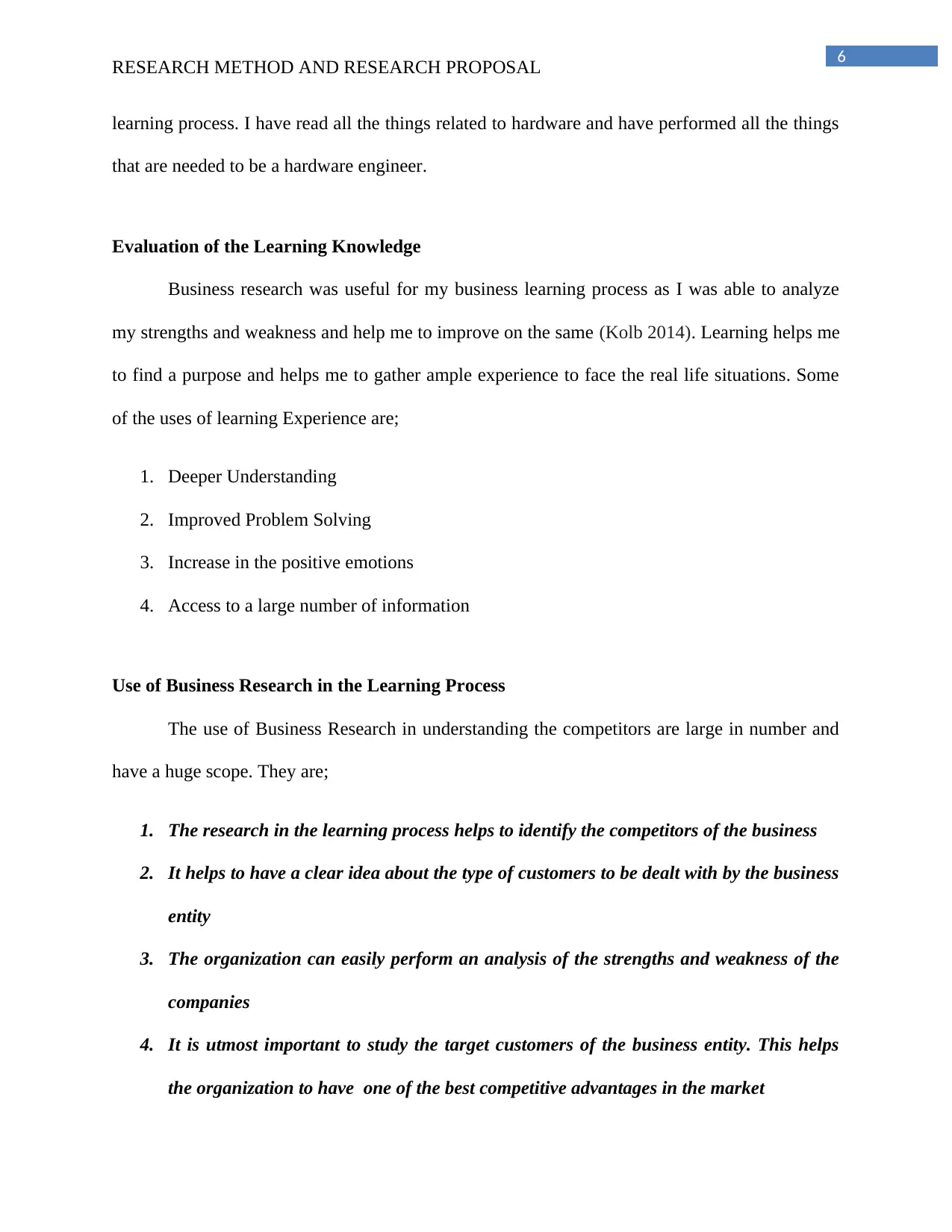
6
RESEARCH METHOD AND RESEARCH PROPOSAL
learning process. I have read all the things related to hardware and have performed all the things
that are needed to be a hardware engineer.
Evaluation of the Learning Knowledge
Business research was useful for my business learning process as I was able to analyze
my strengths and weakness and help me to improve on the same (Kolb 2014). Learning helps me
to find a purpose and helps me to gather ample experience to face the real life situations. Some
of the uses of learning Experience are;
1. Deeper Understanding
2. Improved Problem Solving
3. Increase in the positive emotions
4. Access to a large number of information
Use of Business Research in the Learning Process
The use of Business Research in understanding the competitors are large in number and
have a huge scope. They are;
1. The research in the learning process helps to identify the competitors of the business
2. It helps to have a clear idea about the type of customers to be dealt with by the business
entity
3. The organization can easily perform an analysis of the strengths and weakness of the
companies
4. It is utmost important to study the target customers of the business entity. This helps
the organization to have one of the best competitive advantages in the market
RESEARCH METHOD AND RESEARCH PROPOSAL
learning process. I have read all the things related to hardware and have performed all the things
that are needed to be a hardware engineer.
Evaluation of the Learning Knowledge
Business research was useful for my business learning process as I was able to analyze
my strengths and weakness and help me to improve on the same (Kolb 2014). Learning helps me
to find a purpose and helps me to gather ample experience to face the real life situations. Some
of the uses of learning Experience are;
1. Deeper Understanding
2. Improved Problem Solving
3. Increase in the positive emotions
4. Access to a large number of information
Use of Business Research in the Learning Process
The use of Business Research in understanding the competitors are large in number and
have a huge scope. They are;
1. The research in the learning process helps to identify the competitors of the business
2. It helps to have a clear idea about the type of customers to be dealt with by the business
entity
3. The organization can easily perform an analysis of the strengths and weakness of the
companies
4. It is utmost important to study the target customers of the business entity. This helps
the organization to have one of the best competitive advantages in the market
⊘ This is a preview!⊘
Do you want full access?
Subscribe today to unlock all pages.

Trusted by 1+ million students worldwide
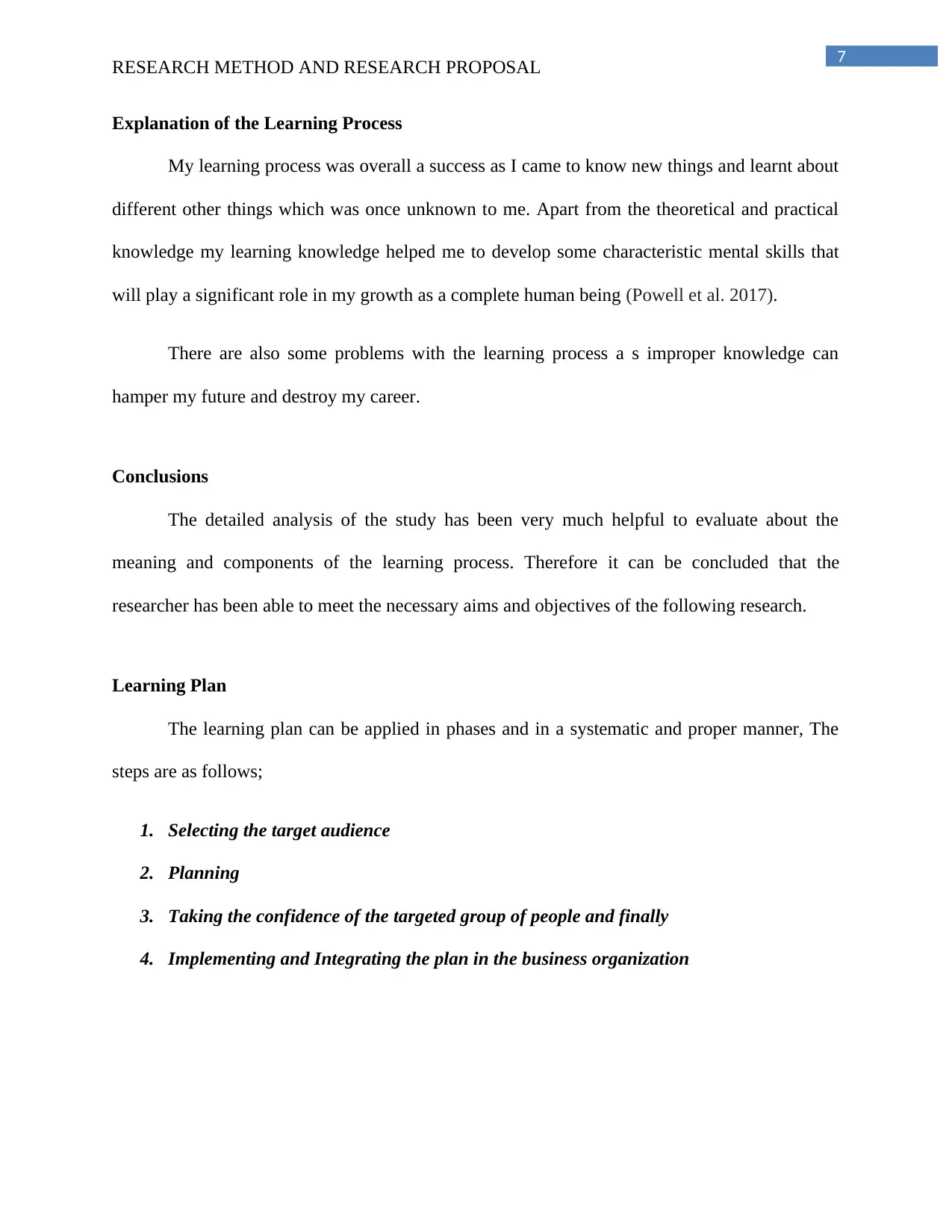
7
RESEARCH METHOD AND RESEARCH PROPOSAL
Explanation of the Learning Process
My learning process was overall a success as I came to know new things and learnt about
different other things which was once unknown to me. Apart from the theoretical and practical
knowledge my learning knowledge helped me to develop some characteristic mental skills that
will play a significant role in my growth as a complete human being (Powell et al. 2017).
There are also some problems with the learning process a s improper knowledge can
hamper my future and destroy my career.
Conclusions
The detailed analysis of the study has been very much helpful to evaluate about the
meaning and components of the learning process. Therefore it can be concluded that the
researcher has been able to meet the necessary aims and objectives of the following research.
Learning Plan
The learning plan can be applied in phases and in a systematic and proper manner, The
steps are as follows;
1. Selecting the target audience
2. Planning
3. Taking the confidence of the targeted group of people and finally
4. Implementing and Integrating the plan in the business organization
RESEARCH METHOD AND RESEARCH PROPOSAL
Explanation of the Learning Process
My learning process was overall a success as I came to know new things and learnt about
different other things which was once unknown to me. Apart from the theoretical and practical
knowledge my learning knowledge helped me to develop some characteristic mental skills that
will play a significant role in my growth as a complete human being (Powell et al. 2017).
There are also some problems with the learning process a s improper knowledge can
hamper my future and destroy my career.
Conclusions
The detailed analysis of the study has been very much helpful to evaluate about the
meaning and components of the learning process. Therefore it can be concluded that the
researcher has been able to meet the necessary aims and objectives of the following research.
Learning Plan
The learning plan can be applied in phases and in a systematic and proper manner, The
steps are as follows;
1. Selecting the target audience
2. Planning
3. Taking the confidence of the targeted group of people and finally
4. Implementing and Integrating the plan in the business organization
Paraphrase This Document
Need a fresh take? Get an instant paraphrase of this document with our AI Paraphraser
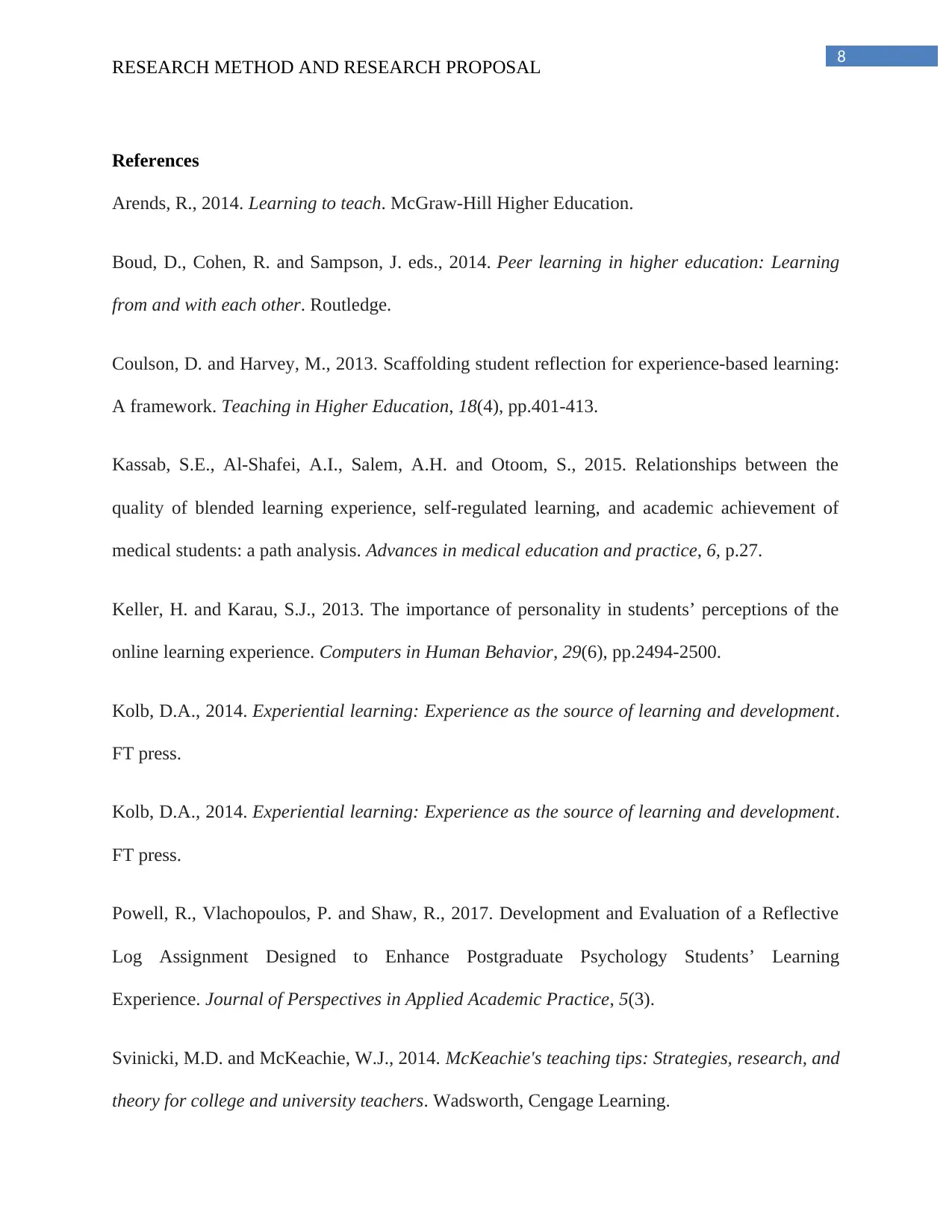
8
RESEARCH METHOD AND RESEARCH PROPOSAL
References
Arends, R., 2014. Learning to teach. McGraw-Hill Higher Education.
Boud, D., Cohen, R. and Sampson, J. eds., 2014. Peer learning in higher education: Learning
from and with each other. Routledge.
Coulson, D. and Harvey, M., 2013. Scaffolding student reflection for experience-based learning:
A framework. Teaching in Higher Education, 18(4), pp.401-413.
Kassab, S.E., Al-Shafei, A.I., Salem, A.H. and Otoom, S., 2015. Relationships between the
quality of blended learning experience, self-regulated learning, and academic achievement of
medical students: a path analysis. Advances in medical education and practice, 6, p.27.
Keller, H. and Karau, S.J., 2013. The importance of personality in students’ perceptions of the
online learning experience. Computers in Human Behavior, 29(6), pp.2494-2500.
Kolb, D.A., 2014. Experiential learning: Experience as the source of learning and development.
FT press.
Kolb, D.A., 2014. Experiential learning: Experience as the source of learning and development.
FT press.
Powell, R., Vlachopoulos, P. and Shaw, R., 2017. Development and Evaluation of a Reflective
Log Assignment Designed to Enhance Postgraduate Psychology Students’ Learning
Experience. Journal of Perspectives in Applied Academic Practice, 5(3).
Svinicki, M.D. and McKeachie, W.J., 2014. McKeachie's teaching tips: Strategies, research, and
theory for college and university teachers. Wadsworth, Cengage Learning.
RESEARCH METHOD AND RESEARCH PROPOSAL
References
Arends, R., 2014. Learning to teach. McGraw-Hill Higher Education.
Boud, D., Cohen, R. and Sampson, J. eds., 2014. Peer learning in higher education: Learning
from and with each other. Routledge.
Coulson, D. and Harvey, M., 2013. Scaffolding student reflection for experience-based learning:
A framework. Teaching in Higher Education, 18(4), pp.401-413.
Kassab, S.E., Al-Shafei, A.I., Salem, A.H. and Otoom, S., 2015. Relationships between the
quality of blended learning experience, self-regulated learning, and academic achievement of
medical students: a path analysis. Advances in medical education and practice, 6, p.27.
Keller, H. and Karau, S.J., 2013. The importance of personality in students’ perceptions of the
online learning experience. Computers in Human Behavior, 29(6), pp.2494-2500.
Kolb, D.A., 2014. Experiential learning: Experience as the source of learning and development.
FT press.
Kolb, D.A., 2014. Experiential learning: Experience as the source of learning and development.
FT press.
Powell, R., Vlachopoulos, P. and Shaw, R., 2017. Development and Evaluation of a Reflective
Log Assignment Designed to Enhance Postgraduate Psychology Students’ Learning
Experience. Journal of Perspectives in Applied Academic Practice, 5(3).
Svinicki, M.D. and McKeachie, W.J., 2014. McKeachie's teaching tips: Strategies, research, and
theory for college and university teachers. Wadsworth, Cengage Learning.
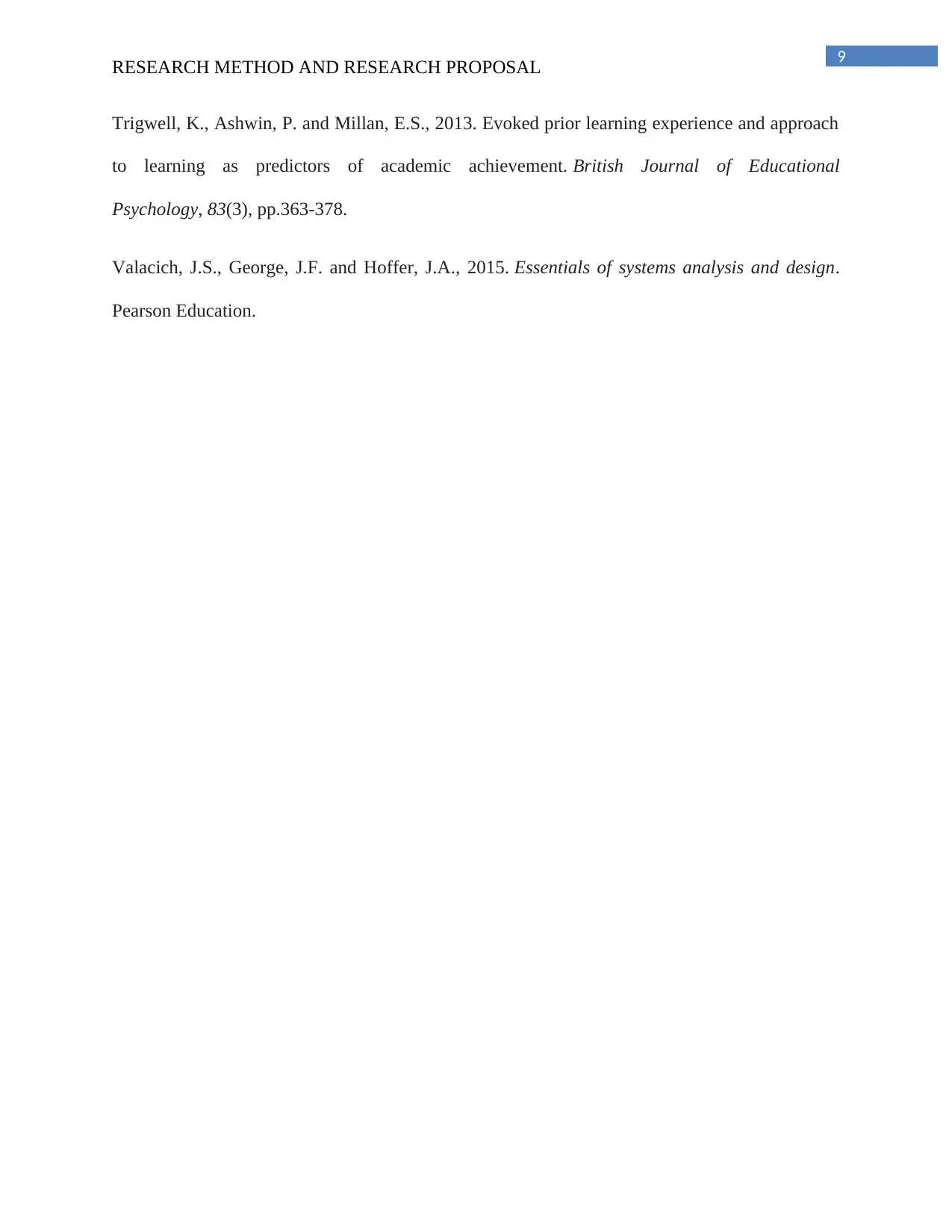
9
RESEARCH METHOD AND RESEARCH PROPOSAL
Trigwell, K., Ashwin, P. and Millan, E.S., 2013. Evoked prior learning experience and approach
to learning as predictors of academic achievement. British Journal of Educational
Psychology, 83(3), pp.363-378.
Valacich, J.S., George, J.F. and Hoffer, J.A., 2015. Essentials of systems analysis and design.
Pearson Education.
RESEARCH METHOD AND RESEARCH PROPOSAL
Trigwell, K., Ashwin, P. and Millan, E.S., 2013. Evoked prior learning experience and approach
to learning as predictors of academic achievement. British Journal of Educational
Psychology, 83(3), pp.363-378.
Valacich, J.S., George, J.F. and Hoffer, J.A., 2015. Essentials of systems analysis and design.
Pearson Education.
⊘ This is a preview!⊘
Do you want full access?
Subscribe today to unlock all pages.

Trusted by 1+ million students worldwide
1 out of 9
Related Documents
Your All-in-One AI-Powered Toolkit for Academic Success.
+13062052269
info@desklib.com
Available 24*7 on WhatsApp / Email
![[object Object]](/_next/static/media/star-bottom.7253800d.svg)
Unlock your academic potential
Copyright © 2020–2026 A2Z Services. All Rights Reserved. Developed and managed by ZUCOL.





